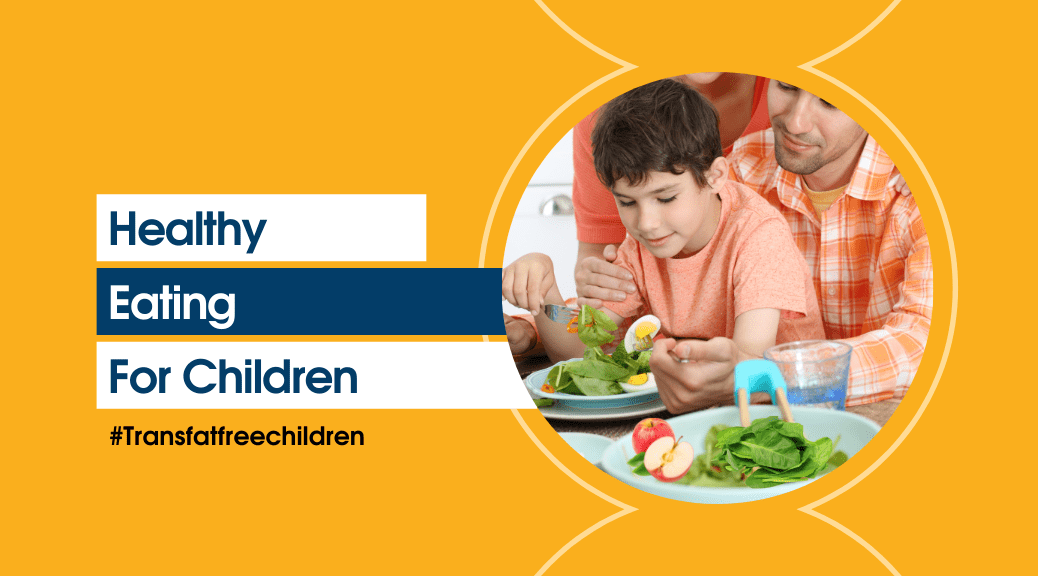Healthy Eating for Children

Some fats are meant to be simply chewed and some to be digested. Though there is a negative feeling towards all types of fats but for children some amount of healthy fats are essential for growth and development. Young kids require enough of them in their diet to help the brain and nervous system develop normally. Foods which are rich in monounsaturated and polyunsaturated fats like nuts, seeds, and fish and oils like olive are good for the overall growth of the child.
The Good, Bad and Ugly Fats
There are three main types of fat – the good, bad and the ugly. “Good fats” have high-density lipoprotein (HDL), while the bad ones have low-density lipoprotein (LDL). Monounsaturated fats and polyunsaturated fats lower your LDL (bad) cholesterol while helping increase your HDL (good) cholesterol. Omega-3 fatty acids are a type of polyunsaturated fat and an essential fatty acid—meaning the body needs them to function but cannot make them so they must be obtained through foods. Some of the sources of good fats include:
- Olive
- Sunflower
- Peanut
- canola
- avocados
- nuts
The bad fats may raise your cholesterol and are mainly found in animal products. They are mainly solid at room temperature. They are found in chicken with the skin on, whole-fat dairy products, butter, cheese, ice cream.
The devil of all the fats is trans fats – which is made by adding hydrogen to liquid vegetable oils to make them more solid, thereby increasing the shelf life of foods.
Trans-fats can be found in the following foods:
- Fats And Oils: Vanaspati, Bakery Shortenings and Margarine
- Baked Foods: Biscuits, Puff, Cakes, Pastries, Cookies, Cream Rolls
- Fried Snacks: Puri, Pakodas, Namkeens, Jalebis, Gulab Jamuns, Boondi Laddus
- Processed And Packaged Foods: Meat Pies and Sausage Rolls
What’s all the noise for?
These trans fats are considered hazardous to our health as it increases bad (LDL) Cholesterol and reduces good (HDL) Cholesterol. These fats play a major role in the rise of non communicable diseases or NCDs, like heart and other cardiovascular diseases, and even cancer, according to some studies.
As the child is in his or her formative years, it is crucial that they be introduced to some healthy eating from early on. Some of the severe health harms that trans fats may lead to are:
- Excess inflammation
- Many non communicable diseases, like coronary disease, arthritis, and metabolic syndrome
Consumption of trans fat has been linked to negative changes in lipoproteins, systemic inflammation, coronary heart disease, and diabetes mellitus. Evidence of processes leading to these conditions has also been found in children.
What is India’s stand on trans fats
As per the World Health Organisation (WHO), approximately 5.4 lakh deaths take place each year globally because of intake of industrially produced trans fatty acids. The WHO has called for the elimination of industrially-produced trans fatty acids from the global food supply by 2023.
India has unveiled regulations to limit trans fat in oils and fats, an important step for public health that will prevent thousands of deaths every year. The Food Safety and Standards Authority of India (FSSAI) has announced that all edible refined oils, vanaspati, bakery shortening, margarines, vegetable fat spreads and mixed fat spreads may only contain up to 3% trans fats by January 2021 and 2% or less trans fats by January 2022. The move is the first step by FSSAI towards fulfilling its commitments made in 2018 to reduce trans-fats in both edible oils and in all foods. Within a week of capping trans fats in oil, FSSAI caps trans fats in foods. “Food products in which edible oils and fats are used as an ingredient shall not contain industrial trans fatty acids more than 2% by mass of the total oils/fats present in the product, on and from 1st January, 2022,” said the revised regulations notified recently and made public on February 5, 2021.
Some ways to keep fat intake within recommended ranges:
- Increase concentration of fruits and vegetables in your child’s diet
- When eating out, help kids make balanced choices that don’t include large amounts of fat.
- Choose healthier, unsaturated fats when preparing meals for your family
- Pack healthier options for school lunches instead of packaged food
- Opt for healthy snacks that are naturally free of trans fats: Mixed Nuts, Sprouts, Salads, Fruits, Yogurt
- Do not repeatedly reheat oil or reuse the same oil for frying
- Avoid using ‘vanaspati’ for cooking/frying.
It is never too late to start. Make a healthy eating environment at home, stay happy, exercise regularly and you will see children will make healthy eating a way of life!
